#we need more mainstream ace rep in popular shows
Explore tagged Tumblr posts
Text
I am, once again, here to say that I NEED aromantic/asexual Eloise Bridgerton to be canon. I know it's not book canon but we know the show is taking a different turn with Francesca and Benedict, so I hope we get to see Eloise realising she does not wish to marry.
#bridgerton#eloise bridgerton#asexual eloise bridgerton#i absolutely love francesca and benedict#our queer icons#i know that eloise wont be canonically asexual but i would be so happy if it became a reality#we need more mainstream ace rep in popular shows#come on netflix
49 notes
·
View notes
Note
I remember fics booming during long Sherlock hiatuses back in the day.
True, but tumblr was still extremely popular at this point. Not saying it's dead now, but the porn ban definitely had an impact. I also think the outrage at the writers (insane and idiotic as it was) kept it in the mainstream. Back in the 2010s my mom knew about the drama surrounding Moffatt/Gatiss and the queerbaiting allegations. She didn't even watch the show, she heard about it on Pinterest of all things. Hell, the only reason I watched the show was bc I saw a thread here in like 2013.
We have a few people who are mad at the ending of go2, but it's nothing compared to the hubbub around things like Sherlock or SPN. The internet thrives on discourse, so it's not as interesting to others outside the fandom.
There's also the matter of internet etiquette and how, over the years, fans have come to expect consistent content and pay authors little to no mind. But that is a whole 'nother can of worms. I expect the go2 fics will become more popular over time, and I hope the lack of engagement isn't too discouraging bc I do really enjoy what I've read so far.
Hmmm. Yeah, this reminds me of what I talked about like last week or so with all of the tumblr polls I've seen asking how long people have been on here saying that the vast majority of users have been here for at least a decade. Sherlock's prime definitely lined up with tumblr's prime (I only watched it because an irl friend was blogging about it on here lol). I didn't come here until 2013 and was pretty blissfully unaware of the discourse for about a year, but I have heard from other fans that the online fan situation around that show started to get nuts right after s2 in 2012. Outrage does drive engagement, whatever that may look like. I think the ending of Sherlock s2 was perfect material for fanfiction with everyone wanting to know how Sherlock survived the Fall and how John would react upon his return, too. There were soooo many Post-Reichenbach fics, it was an entire genre. And then with s3, there was a flood of fix-it fics with people's anger over Mary, and exploration of her villainy.
You're right, gomens s2 doesn't have that same effect because it's pretty obvious that this is being written like a classic love story and everything is going to be resolved in the third act. There's no mainstream backlash. The only people who are angry about it, from what I've seen, are people who apparently don't know how basic storytelling works and are really pissed at Aziraphale (that's another reason why people might not be reading fics tbh), and those big mad over the kiss because, "it's ruins ace rep" and blah blah blah. But those people are in the clear minority. Some people may not feel the need to read fic because they trust all will be well in the next season and they just have to wait. Basically, the source material satisfies them enough that they're not seeking out fic in the same way they were after s1's homoerotic ambiguity.
You're totally right that fans have gotten worse to content creators in recent years. They want a constant stream of free fic and art without having to, god forbid, hit a heart button or kudos button. I've been in fandom spaces for a long time and that's definitely worsened over time, although I'm lucky that some fans have been nice enough about my gomens fics to make art/translations/etc. But that's for my s1 stuff and I know that's certainly not the case for everyone's fics. I hope the lack of engagement isn't too discouraging, too, but I completely understand if it is for some people.
#I do think your mom is pretty exceptional#for hearing about the Sherlock backlash a decade ago on pinterest lmao#exceptional for older adults not on tumblr I mean#my mom is oblivious to all things fandom unless I tell her#replies
2 notes
·
View notes
Text
SHADOW’s Queer Coding
I first started exploring this idea of Sk8′s implicit queer rep (as in stuff other than explicit same sex intimacy) in this post.
I know we like to joke that Hiromi is the Token Straight of the protag gang, but I argue that he’s as much an example of queer rep as any of our main characters, albeit in a less conventional and fanservicey way.
So that’s what this post is gonna be, an analysis of Hiromi/SHADOW as a queer figure, how his character fits the Jekyll/Hyde archetype as a metaphor for queerness and The Closet, the similarities between SHADOW as a skatesona and early drag, and how his character represents a larger problem of exclusion within queer fandom spaces.
The 1886 Gothic novella The Strange Case of Dr. Jekyll and Mr. Hyde by Robert Louis Stevenson is the origin of the phrase “Jekyll and Hyde”. What I’m calling the Jekyll/Hyde archetype, refers to the same thing; it refers to duality, to a character who is “outwardly good but sometimes shockingly evil” (as described from the novella’s wiki page).
And the Jekyll/Hyde dynamic has also long been associated with Queerness. The antagonism between Jekyll and Hyde as two sides of the same person resonates with many people as similar to the experience being in the closet, and many many scholars have written about this queer reading of Jekyll and Hyde. Do a quick google search if you don’t believe me.
Hiromi experiences his own Jekyll/Hyde duality through his SHADOW persona, which seems to entirely contradict with Hiromi’s day to day personality.
Whilst Hiromi is sweet, romantic, and generally very cutesy, SHADOW is mean-spirited, sadistic, described as “the anti-hero of the S community.” And though these two personalities seem entirely at odds, SHADOW doesn’t exist in a vacuum, he’s very much a part of Hiromi. In the show, this manifests as SHADOW’s sabotage moves being all flower themed, as Hiromi works in a flower shop, and how he’ll “step out” of character when playing babysitter to the kids.
Below is passage from an essay titled, “The Homoerotic Architectures of Strange Case of Dr. Jekyll and Mr. Hyde” which reminds me a lot of Hiromi’s character, such that I think his character arc can be read as an allegory for coming out and self acceptance.
The closet, here, is a space not only for secrecy and repression, but also for becoming; it is the space in which queer identities build themselves up from “disused pieces” and attempt to discover the strength needed for presentation to the world. The closet is both a space of profound fear and profound courage—of potentiality and actualization. (Prologue)
Unlike the kid/teen characters, the show’s adult characters all lead double lives. When they aren’t skating, they have day jobs. Kaoru is a calligrapher, Kojiro is a restaurant owner, Ainosuke is a politician/businessman (but tbh his job is just being some rich dude), and Hiromi works in a flower shop.
But of the adult protagonists (so not Ainosuke), Hiromi compartmentalizes the most.
Kojiro leaves his face totally exposed such that he can be recognized both on and off the skate scene. Kaoru at least covers his face, but his trademark pink hair and constant use of Carla doesn’t make it very hard to connect the dots between him and CHERRY. He’s also always with Kojiro in the evenings, so if you don’t recognize him as CHERRY when he’s on his own, you certainly will when you see him interacting with Kojiro/JOE.
Next to these two, Hiromi seems the more adamant at separating his Work from Play.
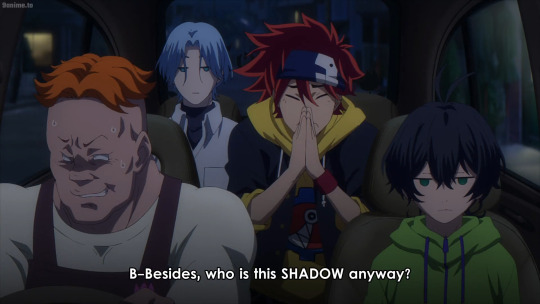
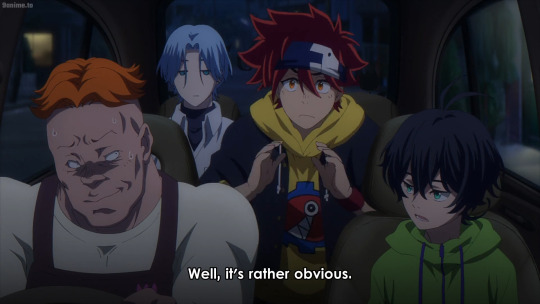
Even when he’s been clearly found it, he still tries to deny that he and SHADOW are the same person. Miya even uses this to coerce Hiromi into helping him and the boys:
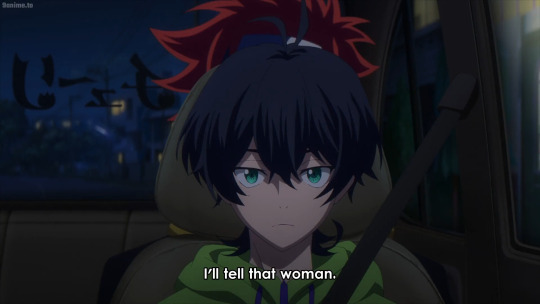
I don’t think it’s a stretch to say that the separation between Hiromi and SHADOW can be interpreted as a metaphor for being in The Closet. As SHADOW, he leads a secret life, one characterized by an tight-knit underground community with a vibrant night scene, where he behaves in ways typically frowned upon by larger society. He worries about being found out and judged by the people close to him.
But in Ep 4, the walls of his Closet begins to come down, or in this case is literally imposed upon by other members of his community, by its younger members, who don’t feel the same need to hide their passion for skateboarding or lead the same kind of double life.
We then see the line between Hiromi and SHADOW begin to blur.
He becomes less of an antagonist, and instead the audience sees him become a mentor and “mother hen” figure for the younger skaters. Later on in Ep 4, we see him casually interacting with the other protags in full SHADOW mode, not as an “anti-hero” but as a friend. In Ep 6, he acts as a babysitter for the kids, and we see him totally comfortable appearing both in an out of his SHADOW persona throughout their vacation.
And I think that this gradual convergence of Hiromi and SHADOW will culminate in this tournament arc.
There’s something more personal that’s driving SHADOW to do well in this tournament. It’s not just for bragging rights or his pride as a skater, but the results of this tournament is going to have some kind of greater impact on Hiromi’s personal life. Personally, my theory is that Hiromi is using this tournament to prove to himself that he’s worthy enough to ask his manager out on a date.
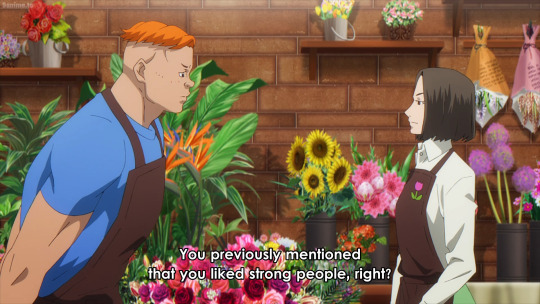
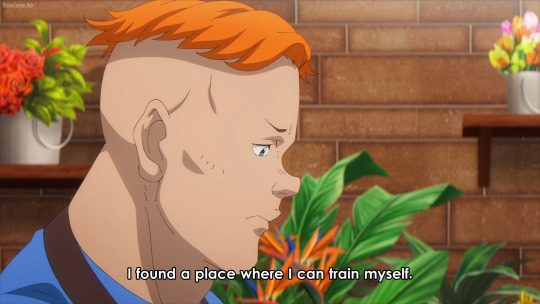
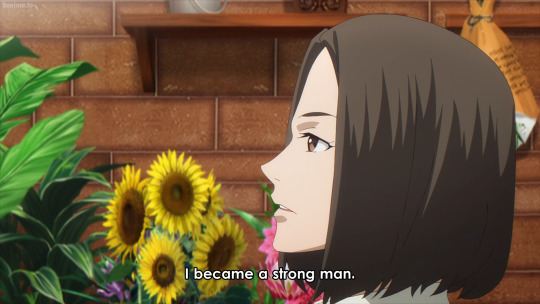

Hiromi is no longer compartmentalizing, his two lives are overlapping and influencing each other. Recall the essay quote I cited earlier:
The closet... is the space in which queer identities build themselves up from “disused pieces” and attempt to discover the strength needed for presentation to the world... of potentiality and actualization.
This is exactly the case for Hiromi. Through skating, he is piecing together the disparate parts of him such that he can present himself to the world as a more unified and confident being.
And the show presents the very skating community that Hiromi has been working so hard to keep separated from his personal life- Reki, Langa, Miya, Kaoru, and Kojiro- as the catalyst for that becoming.
That, my dear readers, is queer coding if I ever saw it.
But there’s probably gonna be people claiming something along the lines of “But SHADOW can’t be queer rep because he’s Straight!” And I assume that’s because he shows romantic interest in his female manager.
First of all, Bisexuality. Also Ace/aro-spec people. And second of all, SHADOW is Hiromi’s drag persona.
And before anyone can say anything about how Hiromi can’t do drag because he’s straight (assumption) and cis (also an assumption) uhhhh no, fuck you.
Drag didn’t start with RuPaul’s Drag Race, that’s just how it got mainstream. And it’s also how it got so gentrified and transphobic. You heard me. But anyway.
Drag is, and has always been, first and foremost about exaggerated, and oftentimes satirical, gender presentation and performance. It’s about playing with gender norms through artistic dress and theater, not so much to do with sexuality or gender identity.
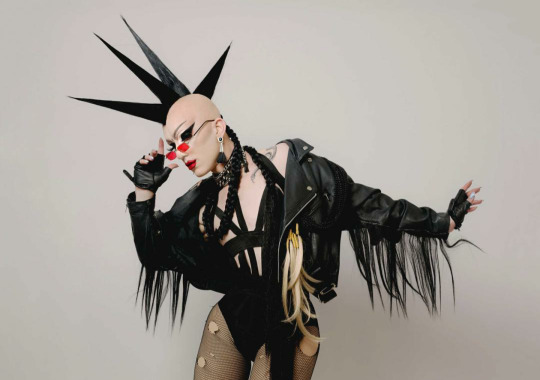
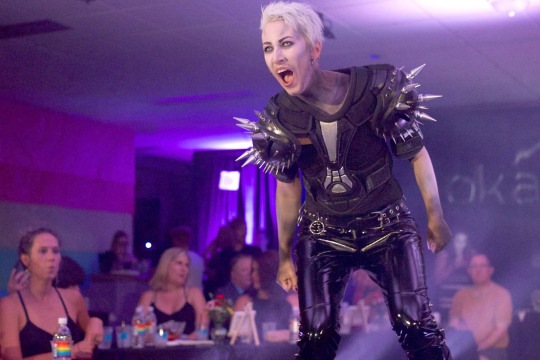
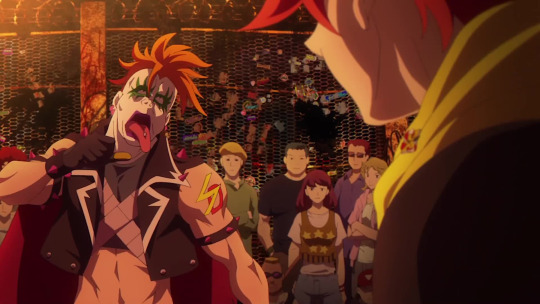
Literally, what’s the difference here?
SHADOW is a persona of exaggerated masculinity with a punk aesthetic. Regardless of his sexuality or gender identity, Hiromi’s gender performance as SHADOW is drag- that makes him queer representation, change my fucking mind.
Queerness is more than same-sex romance, and by extension, good queer representation is not limited to canonized gay ships. The very word Queer, in it’s ambiguity, is meant to encompass the richly unique experiences of everyone within the LGBTQ+ community.
In my opinion, Queer =/= Gay. I mean, they’re colloquially the same yes and even I use them interchangeably. But for the purpose of this post, they’re not the same, and that’s to argue that Hiromi/SHADOW’s lack of acknowledgement as queer rep illustrates a larger issue of exclusion within fandom.
I mean, this is something we all kinda been knew, but in the case of Sk8 specifically, there are a two main reasons why I think Hiromi is rarely acknowledged as queer rep.
1. He’s not shippable with another male character
Fandom favors mlm ships when it comes to what’s considered good queer rep. And the ultimate mark of good queer rep is explicit acts of romance or intimacy between two male characters. Unlike with any of the other characters in the show, we can’t point to Hiromi and automatically clock him as gay, especially because he expresses romantic interest in a woman.
So by default, he’s less popular, because “Ew Straight People” amirite /s.
2. He’s not attractive
This is really interesting, because like JOE, Hiromi is a beefcake.

But fans don’t thirst over him the same way they do over JOE. Granted, the show really plays up JOE’s muscles in a very strip-teasey way that literally encourages viewers to find him attractive. By contrast, Hiromi is pretty much covered head to toe and he paints his face in theatrical makeup- the point is to look scary, not attractive.
In essence, even though Hiromi engages in “queer behavior” through his SHADOW persona, his queerness isn’t palatable.
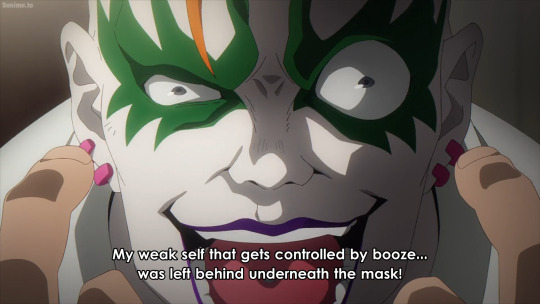
But I also think there’s some pretty insidious undercurrents of fetishization going on here, of both Asian people AND gay men. Which is... a whole other thing I really don’t have the capacity to unpack completely.
But basically, Hiromi doesn’t fit into any of the popular BL archetypes so he’s less likely to recognized as Queer. Relatedly, he’s also less often subjected to a fetishistic gaze as other characters. I mean...
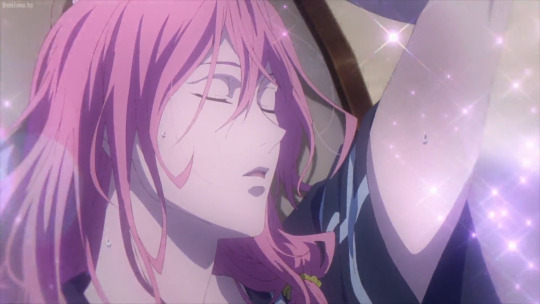
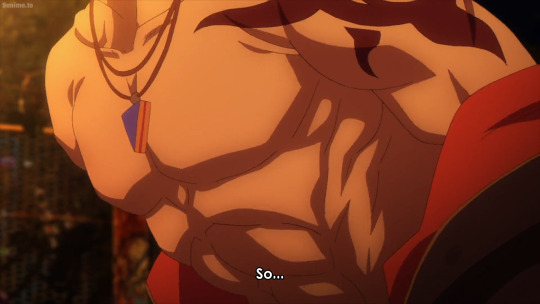
So again, fans just don’t find him as appealing. Attractive characters are always more popular than ugly ones.
And I’m sure there are a lot of people who just don’t care for Hiromi’s personality, that’s fine, he does act like an asshole sometimes. But this post is meant to illustrate that queer rep takes multiple forms, and unfortunately I think a lot of media just tends to fall back on stereotypical portrayals of queer people for the sake of broader appeal. And by consequence, the fandom’s idea of what constitutes queer rep narrows to same-sex romance, usually between two cis gay men.
With the release of Ep 9, I know a lot of people queer people are going to find representation in the Kojiro’s whole “unrequited love” thing. But personally, I feel more represented by Hiromi, his journey of self-acceptance and subversive relationship with gender- that’s what resonates with me as a trans person.
And I think it’s important to see that kind of less palatable type of queer representation more acknowledged in fandom, and in Sk8′s fandom especially, because I know the demographics of this fandom lean heavily queer.
But that’s all for now, lemme know what you guys think :)
#if there are typos forgive me i'm tired#i've been sitting on this take for a number of weeks now#i rlly hope i'm big braining rn#and not just like#yelling into a void#i love hiromi#yall Sleeping on my mans#hav u seen his leather clad ass???#bodacious#sk8#sk8 the infinity#sk8 theory#sk8 meta#sk8 spoilers#sk8 shadow
187 notes
·
View notes
Text
So this has a ton of opinions which I usually stray away from but i really let all my opinions out here. Also there is definitely fact mistakes, probably name mistakes and some incorrect singing terms in here, I wrote this at 2 A.M. with a limited knowledge of theater I’m just trying to get a point across.
Why s2 of hsm the series should have been newsies instead of beauty and the beast:
They say straight up in the show “we need a real Alan Menkhen musical” and they pick beauty and the beast instead of newsies, a literal Broadway stage production???
At first I assumed it was because the cast was primarily male, but that isn’t even a reasonable argument. 1)as shown by s1 when a boy played sharpay, gender doesn’t matter when being considered for a role. 2), a cast with multiple male leads would give the gay men in the show a chance to shine, instead of shoving them to background roles like Chip. Not to mention Carlos is a dancer, and newsies is a musical driven by choreography. 3), since nini moved there are only like 2 lead females anyway, which works for the 2 female roles in newsies.
Casting Wise, the play works SO MUCH better!
Ricky: jack kelley is a much better role for him than the beast for many reasons. First, their personalities are very similar with the mischievous main teen vibe, so the role would be like Troy where Ricky can slip into it easier. Second, it fits him better vocally. It is very clear from listening to Joshua basset sing that he has a relatively high vocal range, and singing low notes or in a deep voice doesn’t come as naturally to him. Jeremy Jordan has a similar vocal range, where he stays in higher octaves and more rarely uses a deep, monotone voice (at least never to the beast’s extent). Ricky would sound perfect singing in Jack’s vocal range. The beast, however, sings almost exclusively in an extremely deep, monotone voice that Joshua cannot easily perform.
Ashlyn: not only does she look quite similar to Katherine, but they have similar personalities as well. Also, katherine’s high and bubbly singing voice would sound lovely with Ash’s, which is also high and bubbly but often softer. This would allow her to push herself to sing louder and more confidently. And she still gets to play a smart bookworm lead female role.
Kourtney: she was born to play miss medda larken. Mrs. Potts’ debut song “beauty and the beast” is a soft romance ballad, which does not match kourt’s stadium reach, strong, powerful voice. “That’s rich” not only shows off her vocals better, but matches her personality and voice much better with the grit and power behind it. Also, Mrs Potts as a character is the soft, motherly type. Miss medda is a rambunctious, empowered, “I got men if I want em but I don’t need em” kinda woman. Which role better fits the girl power, loud, activist, personal cheer squad type person that Kourtney is?
Carlos and Sebastian: not only would this stop shoving the gays and only interesting men other than Ricky to background roles (sorry big red), but it would show off their talents. Seb would make a wonderful crutchy, with his innocent nature and likeness to the character. It would also give him a chance to flex his vocals and sing a duet with Ricky in Santa Fe, further developing the friendships in the show. Carlos could play really any of the main boys, I mostly think he would kill in this due to his dance and choreography skills, which newsies really emphasizes.
Big red: PLEASE this boy would be perfect as Ben Cook’s role (can’t remember the newsie’s name). They’re both the kinda dumb but endearing friend type, and he leads “king of New York”, a song with a killer tap dancing break, which is the whole reason big red wanted to try out! His chemistry with Ricky as crutchy would make that a fine role for him too, but since Sebastian has stronger vocals I think it’s better for him to take a more prominent role while big red relies on his dancing skills over singing.
Gina: though there’s no more lead girl roles, I think she would kill it as mr. Pulitzer. They could add some spice to the character through her insane dance skills, and she would play a great “cunning yet intelligent buisinesswoman” type. This dude also gets 2 or 3 songs, and honestly I don’t remember who she plays in Beauty and the beast so idk.
EJ: I admit Gaston is a perfect role for him and I can’t fit him into newsies well. He would play a good spot conlin, though it is a significantly smaller role. No one really cares about ej though so small loss.
Plot valuability:
doing newsies makes literally way more sense. Firstly, they are kinda planning entering this show last-minute compared to the competition, so to pick a show already written and choreographed for stage production would really save time. (Even though it would still need work to be condensed for a high school production). Second, miss Jen is so determined to stand out from the crowd and win the contest so she picks... beauty and the beast? One of the most popular Disney movies (and honestly with one of Alan’s weaker soundtracks compared to tangled, Aladdin, and the little mermaid imo). Having them do newsies, especially when switching up gender roles like casting Gina as Pulitzer, would actually make them stand apart from the dozens of schools performing Disney movies. It would also give a significantly more impressive vocal and dance performance, since the songs were written for Broadway singers rather than actors. The set is also more cheap and condensed, while still looking professional, which would help with their “we’re too poor and late to afford a straight-up aquarium so let’s do the most with what we’ve got.” Putting the characters in these roles would also not alter their development or main story plots much, besides strengthening certain friendships and pushing aside less popular characters (ej). It would also give more rep for the gays as well as switching up gender roles. Imagine, the gay guys get actual things to do in the show and aren’t defined by the sole plot of “my boyfriend rich” relationship drama! (I love these two but I am a tired ace). Also jerjor performs in both this and tangled the series, so it’s a double whammy for Alan menkhen representation.
Marketability: I know the musical has to be widely known and appealing to viewers. People watched s1 because they love hsm. People also love beauty and the beast, so viewership may raise with fans of the movie. Newsies doesn’t die here, though. It is a very widely popular play among theatre people, and existed first as a movie musical so it isn’t exclusive to theater kids. Also, fans of Newsies are generally between their tweens and early twenties, the exact age demographic for the show. Beauty and the beast is a classic and more widely known, but also doesn’t draw in large numbers of the exact age group you want. Also, the fact that newsies is a little less mainstream only helps the plot point of them choosing it to still have something well known while also standing out from the competition. Doing beauty and the beast is not only an awful choice for casting that limits the actors vocals or is completely out of their range, but it also makes them blend in with the crowd.
Final notes: beauty and the beast was IMO the worst choice for the play this season. Movies like Aladdin and tangled both have very energetic and loud soundtracks that allow these characters to belt their hearts out. Beauty and the beast has a very folksy, quiet, ballad type of track that limits the actors. The only actor that I think sings ballads better than big booming tracks is Nini, who isn’t even in the play this year. Ricky also sings great ballads, which is why ballads that are still slow but also emotional and powerful like “Santa fe” or “something to believe in” (which would sound AMAZING in his and Ashlyn’s voices) fit much better than the deep voice of the beast that he can not comfortably sing in. Also, the beast has very few songs whereas newsies would allow him to belt his heart out in nearly every song with that lovely voice he has. The age range of the newsies cast (that characters are supposed to be 17) fits better with these very teen actors than a movie about old fashioned French young adults. Really newsies was the best musical choice for this season, but I also believe beauty and the beast was the last one they should have chosen.
(After reading comments I rescind my statement that beauty and the beast was the worst choice, but it’s still second to newsies imo)
Feel free to debate me in the comments or point out my mistakes, I’m very open to other points of view
60 notes
·
View notes
Link
Ghost in the Machine, Part 4 — The War on Supplements, Essential Oils and Homeopathy Dr. Mercola By Dr. Mercola If you suspect that supplements are more popular than ever, you are right. More than half of American adults have used one or more supplements and more than half of women and 43 percent of men used a supplement of some kind within the last 30 days.1,2 While that means not takirang vitamins or supplements is now a minority position, it also means Big Pharma is trying to get "in on" the supplement business. The U.S. retail sales of vitamins and supplements is expected to exceed $36 billion in 2017.3 While that's less than a tenth of what Pharma rakes in annually, it has nevertheless caught the drug industry's attention. Also, the highest users of supplements and alternative therapies are the most desirable demographic to marketers — those reporting "excellent" or "very good" health, usually with a higher discretionary income.4 No wonder Pharma and Pharma-supported voices have launched an all-out smear campaign against supplements and alternative therapies. Both categories lack the huge price tags of drugs and encourage patient education and self-care. Supplements and natural products also often treat or prevent the very conditions that enrich drug companies, which further explains Big Pharma's wrath. For example, probiotic-rich fermented food treats the heartburn for which Pharma hawks dangerous proton pump inhibitors (PPIs). Omega-3 fats such as krill oil and other nonprescription products lower heart disease risks without using dangerous statins. Prescription drugs can also increase the need for supplements. If you take a diuretic, an acid-blocking PPI or the diabetes drug metformin, you are more likely to develop vitamin or mineral deficiencies.5 Traditional Media Outlets Question Value of Supplements In 2016, the Journal of the American Medical Association published a large study of U.S. supplement usage that found, according to The New York Times:6 "Americans spend more than $30 billion a year on dietary supplements — vitamins, minerals and herbal products, among others — many of which are unnecessary or of doubtful benefit to those taking them. That comes to about $100 a year for every man, woman and child for substances that are often of questionable value." Elsewhere in recent years, negative news articles about vitamin C, vitamin A and beta carotene, vitamin E, vitamin B6, vitamin D, calcium and multivitamins have run. Supplements like ginkgo biloba, echinacea, fish oil and ephedrine are also under attack, as are homeopathy and aromatherapy.7,8,9,10 Some articles, many written by medical professionals, say supplements are ineffective and a waste of your money; others actually accuse supplements of causing or risking physical harm and even shortening lives. Some medical specialists also accuse supplements of impeding or interfering with drugs taken for other medical conditions.11 In addition to print media and the web, TV news media have joined in the discrediting of the supplement industry, exposing alleged disreputable manufacturers and lobbyists. While I would never defend unethical makers of supplements who put the public at risk, these same news shows largely give Big Pharma a pass even though prescription drugs put the public at a much greater risk. Prescription drug overdoses are the ninth leading cause of death in the U.S., and the death toll continues to rise thanks to the growing opioid addiction crisis.12 Pharma Is a Pot Calling the Kettle Black Leading Pharma's campaign to discredit supplements is the charge that unproven health benefits, not backed by the U.S. Food and Drug Administration (FDA), are claimed by supplement makers. Yet almost every major drug company has entered into a settlement for the same thing, known as "off-label marketing" in the prescription drug world. At least 31 drug companies have been charged with such false promotion including Pfizer, Eli Lilly, Johnson & Johnson, Novartis, Forest, Amgen and Allergan.13 Pfizer paid a $430 million fine for off-label marketing of Neurontin for the non-FDA approved indication of bipolar disorder.14 Eli Lilly engaged in another off-label marketing scheme, trying to market the selective estrogen receptor modulator Evista for the unapproved FDA indication of prevention of breast cancer, and unleashed hundreds of drug reps to sell the unapproved use. Reps were told to hide a disclosure page that said, "The effectiveness of [Evista] in reducing the risk of breast cancer has not yet been established," from the doctors they were trying to sell on the drug, according to the Department of Justice.15 Scott Gottlieb, the new FDA Commissioner, drug stock trader and Pharma consultant, defended Evista's off-label marketing in a Wall Street Journal oped.16 Questions About Product Purity Cut Both Ways Another way that Pharma-friendly voices try to discredit supplements they have yet to sell themselves is through raising questions about their purity, label accuracy and manufacturing process. Here is a quote from Dr. Paul A. Offit, one of the nation's leading drug and vaccine defenders, in an interview about his 2014 book "Do You Believe in Magic?" on Medscape:17 "Look at what happened with this vitamin-maker called Purity First. Purity First, a few weeks ago, had all of its products recalled by the FDA. They made three products. They made vitamin C. They made a multimineral preparation, and they made a B-complex vitamin preparation. What happened was there were 25 women in Connecticut who started to develop symptoms of increased hair where they didn't want hair to be, deepening of the voice, and loss of menstrual cycles because they were inadvertently taking anabolic steroids. Anabolic steroids had contaminated those preparations. How does that happen?... Just imagine if vaccines were inadvertently contaminated with anabolic steroids. You would never hear the end of it, but here somehow it all gets a free pass." Offit is dead wrong. Drugs, vaccines and medical products are frequently recalled for quality and contamination though recalls are seldom reported in the mainstream press. In April 2017, GlaxoSmithKline recalled nearly 600,000 defective Ventolin inhalers.18 In March 2017, generic giant Mylan (of EpiPen fame) said it was recalling 4,005,177 bottles of the cholesterol fighter atorvastatin because of the "potential of an elevated bioburden with identification of objectionable organisms."19 Recalls of biologics (drugs that contain an ingredient extracted from a "biological" source such as cells from humans, animals or microorganisms) have increased significantly, especially for vaccines. From 2007 to 2010, 14 vaccine recalls and 13 recalls for immunoglobulins were made. Additionally, vaccines are not adequately tested for safety and effectiveness using methodologically sound scientific studies before they are licensed, so all of their side effects and long-term negative health outcomes are often unknown. Examples of Supplements, Essential Oils and Homeopathy Therapy at Work The medical literature includes notable examples of supplements and natural remedies that function as valuable medicines. Why do we so rarely, if ever, hear of them on health news sites or TV? Supplements and natural substances cannot be patented and hence present no profit potential for Pharma no matter how dramatic their actions. Here are some supplements for which there is promising evidence of effectiveness: Folic acid, when added to enalapril (an ACE inhibitor used to treat high blood pressure, diabetic kidney disease and heart failure) produced a significant reduction in stroke occurrence in 2015 JAMA research.20 Oregano might be effective against the norovirus, say investigators at the University of Arizona.21 High doses of vitamin C may be useful in the treatment of ovarian cancer, boost the power of chemotherapy and ward off stroke, research indicates.22,23,24 Multivitamins and olive oil are under investigation for their roles in managing breast cancer.25,26 A compound found in a Japanese mushroom could be a cure for the currently untreatable human papilloma virus.27 Vitamin E likely plays an important role in deterring miscarriage.28 Preliminary evidence even suggests that micronutrients could be beneficial in treating adult attention deficit hyperactivity disorder (ADHD), according to 2014 research published in The British Journal of Psychiatry.29 When children with ADHD inhaled vetiver essential oil three times a day for 30 days they had improved brain wave patterns and behavior and did better in school. In patients with allergies, those using homeopathy reported improvements in nasal airflow compared with a placebo group and researchers described a "clear, significant and clinically relevant improvement in nasal inspiratory peak flow, similar to that found with topical steroids." Don't Rule Out Vitamin D In the past few years, vitamin D has gone from a vitamin "hero" whose deficiency potentially explained many maladies, to VNG (Vitamin Non Grata).30,31 The same flip-flop has been seen with calcium, once a good guy, now potentially another supplemental bad guy.32 In fact, vitamin D has been so demonized, the pro-Pharma Forbes site actually writes:33 "Vitamin D supplements, to put it plainly, are a waste of money. (For those concerned about osteoporosis, the widely used drug alendronate (Fosamax®), has been shown to increase bone density by about 5 percent, as explained in a 2011 article by Dr. Sundeep Khosia. But Fosamax has side effects.)" The "side effects" mentioned by Forbes are an understatement. Bisphosphonate bone drugs such as Fosamax and Boniva have been linked to esophageal cancer, jawbone death, heart problems, intractable pain and the very fractures they are supposed to prevent.34 They are one of the most dangerous drug classes ever marketed. Far from a waste of money, vitamin D made such a difference in a 2014 breast cancer survival study, an investigator said "There is no compelling reason to wait for further studies to incorporate vitamin D supplements into standard care regimens."35 Research suggests it may have a valuable role in multiple sclerosis management, diabetes and depression, chronic liver disease and diseases of older age.36,37,38,39 Final Ironies Even as the drug industry attacks the safety, reliability and effectiveness of vitamins and supplements, it creates them itself. In 2013, PGT Healthcare LLP (a venture of Procter & Gamble, Teva and Swisse Wellness) said it would expand its range of more than 100 vitamins, minerals and supplements.40 Other drug giants are also in the supplement business. Sometimes making vitamins results in drug companies making positive instead of negative statements. Here is what research funded by Roche (now DSM Nutritional Products) BASF and Pfizer found about multivitamins41 "A daily multivitamin can help a man reduce his risk of cancer, according to new research from Brigham and Women's Hospital (BWH). The first-of-its kind study will be presented October 17 at the 11th Annual AACR International Conference on Frontiers in Cancer Prevention Research and published online the same day in the Journal of the American Medical Association." Marketing vitamins also subjects Big Pharma to the same false claims charges it cites about the supplement industry. Pfizer, which makes Centrum products, was sued to remove its claims that the products support "energy and immunity," "heart health," "eye health," "breast health," "bone health" and "colon health."42 And although Merck announced December 14 that it plans to sell its subsidiary, Seven Seas, a quick look at its Seven Seas Multivitamin Complete reveals claims that it contains ingredients that "provide adults with energy … as well as a healthy heart … good eye sight, healthy bones and digestion system."43
0 notes
Text
MUP authors coming to the Sydney Writers Festival

A range of wonderful MUP authors are coming to Sydney later this month for the Sydney Writers Festival.
You can catch them at various events over the course of the week, discussing topics ranging from the place of music in writing to the role of feminism in Islam, and from the features of decent, sustainable human communities to the letters Quentin Bryce wrote as a Governor-General.
With such a diverse lineup on offer, there’s sure to be something of interest for everyone!
UPDATE: Louise Milligan is a late addition to the SWF program, joining a session about George Pell with Tom Keneally, James M. Miller and David Marr. See below for details.
Louise Milligan
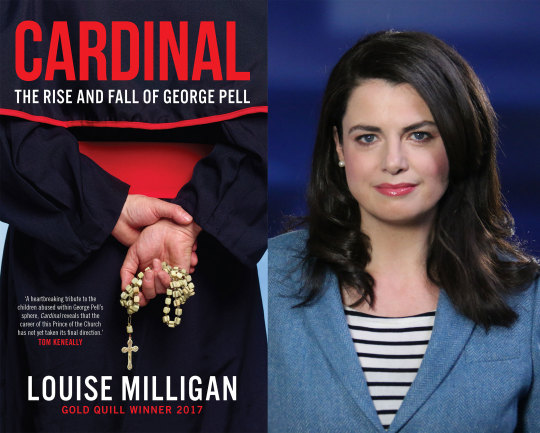
Thursday 25th May, 3pm
Crimes of the Father
As country after country reels from revelations about the systemic sexual abuse of children in the Catholic Church, three of Australia’s pre‑eminent voices discuss the crimes and causes of this institutional dysfunction. Tom Keneally (Crimes of the Father), James M. Miller (The Priests) and Louise Milligan (Cardinal) join David Marr (Quarterly Essay: The Prince) for a powerful conversation about sexual abuse, conscience and celibacy in the Catholic Church.
Mark McKenna

Thursday 25th May, 10am
Being a Historian in the Digital Age
As advancements in technology allow us to revisit and revise our past, what is gained and what is lost? Nick Brodie’s 1787 counters the established narrative of Australian settlement, Tom Griffiths explores our changing understanding of Australian history in The Art of Time Travel and Mark McKenna’s From The Edge uncovers Australia’s forgotten stories. Join them in a discussion with Jürgen Tampke to gain a new perspective on the way we think about the past.
Thursday 25th May, 1.30pm
Mark McKenna on Music and Writing
For historian Mark McKenna (From the Edge: Australia’s Lost Histories) music and writing are intimately connected. Exploring the relationship between music and the literary imagination, Mark poses some interesting questions. Why do some writers require music, and others need silence? Do particular kinds of music enhance particular kinds of writing? Can music improve our capacity for insight? And could there be parallels between various musical interpretations of the same score and historians’ different interpretations of the same document?
Thursday 25th May, 4.30pm
Things You Need to Know and May Have Missed
From LGBTI bushrangers to early stories of travel and conquest, learn something new with this panel of history buffs led by Mark McKenna. David Hunt (True Girt) highlights the humour in Australian history, while Jürgen Tampke (A Perfidious Distortion of History) addresses misinformation about WWII. Nick Brodie (1787) offers an alternative take on Australian settlement, and Bruce Pascoe (Dark Emu) argues that we must take a new look at Australia’s past.
Susan Carland
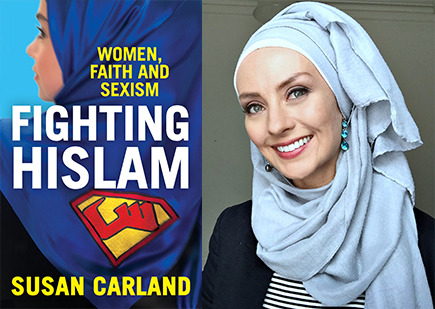
Thursday 25th May, 7.30pm
The Full Catastrophe
This is a special Sydney Writers’ Festival edition of the Giant Dwarf’s The Full Catastrophe: a live show about when life was so bad, it was funny. Some of the Festival’s most distinguished guests come together in front of a live audience to confide about a painful and hilarious incident in their lives. Hosts Sarah Macdonald and Rebecca Huntley welcome guests Clementine Ford (Fight Like a Girl), academic Susan Carland, Miles Franklin award-winning writer Frank Moorhouse, performance poet Ivan Coyote and journalist Desi Anwar (CNN Indonesia).
Friday 26th May, 3pm
Stan Grant: The Australian Dream
In 2015, Wiradjuri man and award-winning journalist Stan Grant made a splash with his book Talking to My Country. In his new landmark Quarterly Essay, he makes the case for a more capacious Australian Dream with a place for all Indigenous people that includes those flourishing on intellectual, cultural and sporting fields, as well as those in detention or living in the shadows. He appears in conversation with Susan Carland.
Friday 26th May, 4.30pm
Fighting Hislam and Beyond Veiled Clichés
The role of women in Islam is hotly debated among Muslims and non-Muslims alike. Yet Muslim women’s perspectives are often excluded from mainstream discussion. Journalist Amal Awad wrote Beyond Veiled Clichés to explore life from the perspective of Arab women, both in the West and the Arab world. Susan Carland is an academic and author whose book Fighting Hislam proffers a new kind of feminism in which religious beliefs co-exist with women’s rights. They talk to Yassmin Abdel-Magied.
Quentin Bryce

Thursday 25th May, 4.30pm
Dear Quentin: Letters of a Governor-General
In her six years as Australia’s Governor-General, Dame Quentin Bryce AC handwrote more than 50 letters a week. Since leaving office, she has put together Dear Quentin, a rich collection of the letters she wrote and received. Her letter-writing wit and skills were honed in boarding school, when she wrote to her parents weekly. It was perfect training for writing missives to those she met on trips around Australia and the world. She speaks with Ita Buttrose AO OBE about a life in letters.
Ruth Quibell

Sunday 28th May, 9am
Coffee and Papers with the SMH: Ruth Quibell
Some things are worth getting up early for, especially when coffee and great conversation are guaranteed. Catch up on the news with The Sydney Morning Herald at the Festival’s first session of the day. Join SMH editors and journalists, and special guest Ruth Quibell, to hear what’s making headlines, and the stories we need to follow.
Sunday 28th May, 4.30pm
SWF Gala: Maybe This Will Help
Some of the Festival’s most distinguished guests reveal personal tips for these anxiety-inducing times – from chicken soup to Valium. How do we keep sane in a time of Brexit and Trump, human rights abuses and climate change? Binge on Netflix? Mainline pinot gris? Move to Canada? Sofija Stefanovic talks to Hisham Matar (The Return), Bill Hayes (Insomniac City: New York, Oliver, and Me), Ivan Coyote, Jamie Morton, New York Times Book Review editor Pamela Paul, and sociologist Ruth Quibell about remedies for chaos.
Chloe Shorten
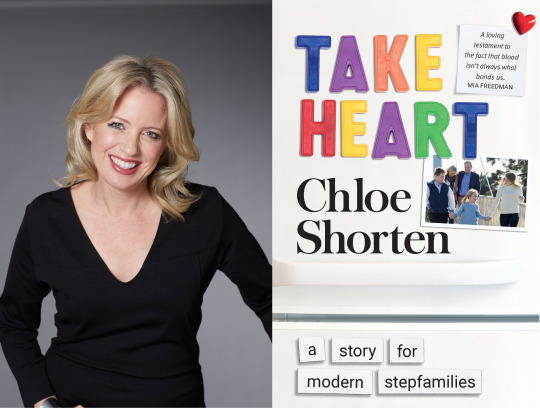
Friday 26th May, 3pm
You’re Doing It Wrong: A Guide to Modern Parenting
There’s no manual for raising a child. But there are an awful lot of books. Lucy Clark’s Beautiful Failures questions the purpose and pressures of childhood, the latest The Chaser Quarterly is about parenting, and editor Charles Firth shares some of the insights about creativity and parenting. In Still Lucky Rebecca Huntley explored questions including, ‘why do we over-parent?’. Chloe Shorten has been at the parenting frontline, and her book Take Heart: A Story for Modern Stepfamilies is a warts-and-all examination of the challenges of blending families and the social stigma faced by those who don’t fit the norm. A must-have conversation for our times – you’re guaranteed to feel the prick of guilty recognition more than once.
Rodney Syme
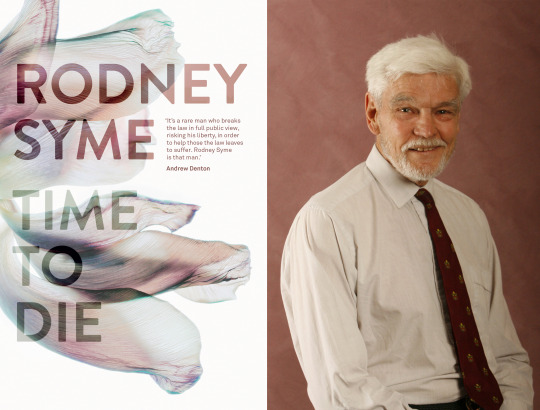
Friday 26th May, 10am
Near-Death Experience
Death is our most fascinating taboo subject. ABC’s Michaela Kalowski leads a thought-provoking discussion about euthanasia with four authors who have written about death. Steven Amsterdam’s The Easy Way Out looks at what it’s like for the people tapped to do the deed. After is Nikki Gemmell’s searing account of her mother’s decision to end her own life. In his memoir Admissions, neurosurgeon Henry Marsh tries to understand what matters in the end. In Time to Die, Rodney Syme tackles questions around assisted dying.
Mark Moran
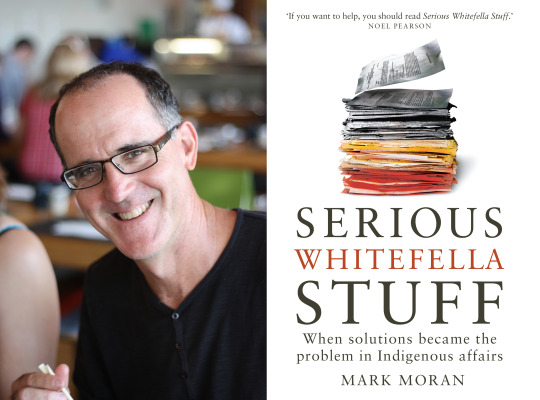
Friday 26th May, 1.30pm
System Breakdown
In The End of Patriarchy: Radical Feminism for Men Robert Jensen asks, ‘How do we create and maintain stable, decent human communities that can remain in a sustainable relationship with the larger living world?’ Robert helps plot the societal changes needed in our changing world with Tim Flannery (leading writer on climate change), Penny Griffin (Popular Culture, Political Economy and the Death of Feminism: Why Women are in Refrigerators and Other Stories), Professor Mark Moran (author of Serious Whitefella Stuff). Moderated by Melanie Joosten.
Mark Di Stefano
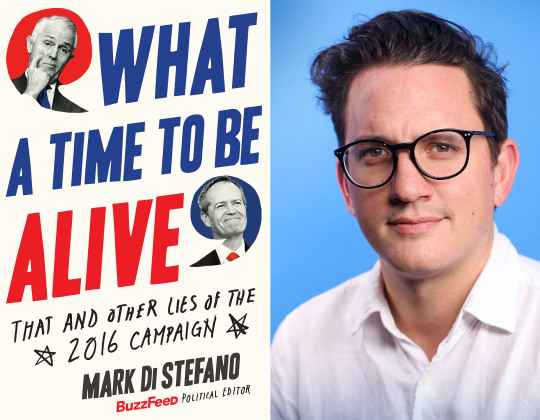
Thursday 25th May, 1.30pm
Question Time
Point of order on the grounds of weirdness. From the Senate to the House of Reps, Australian politics just keeps getting stranger, thanks to leaks, spills and other hazardous accidents. Join the Guardian’s Bridie Jabour in conversation with political editors Mark Di Stefano from BuzzFeed, the ABC’s Chris Uhlmann, long-time political reporter Steve Lewis and writer Jeff Sparrow as they recount – and attempt to explain – some of the latest goings-on in Canberra and beyond.
Friday 26th May, 6.30pm
Sincerest Form of Flattery
Sincerest Form of Flattery is a show like no other. Some of the Festival’s most daring guests find themselves standing on the shoulders of giants (and then metaphorically riding those giants on a comedy-rampage, destroying entire villages in their wake). Each guest is tasked with writing and performing a piece in the style of a literary great. Hosted by Ben Jenkins, this event unfolds like a literary covers night, starring Mark Di Stefano, Richard Fidler, Rebecca Shaw and Jeff Sparrow.
Sunday 28th May, 11.30am
25 Years of Looking for Alibrandi: Have a Say Day
To mark 25 years of the classic Australian ‘coming of age’ novel, Looking for Alibrandi, our all-star panel lovingly recreates the central plot point when Josie Alibrandi makes a speech at Have a Say Day in Martin Place and meets Jacob Coote for the first time. Host Pia Miranda joins Looking for Alibrandi author Melina Marchetta, Yassmin Abdel-Magied, Mark Di Stefano, Gen Fricker, Brodie Lancaster and Rajith Savanadasa as they unleash their inner Josies and have their say.
0 notes